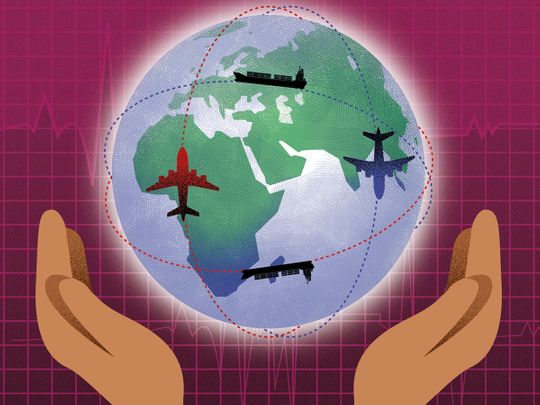
On March 11, 2020, as the novel coronavirus spread across more than 110 countries and territories worldwide, the World Health Organisation officially declared the outbreak of COVID-19 a pandemic. Since then, we have witnessed countries locking their borders, airlines grounding their planes, hospitals and morgues swelling past capacity, large corporations limiting or stopping services and schools closing, leaving millions of students without instruction. For the first time in 100 years, countries began adopting an inward-oriented approach as a strategy to contain the pandemic. This new orientation sparked speculation among economists and researchers worldwide: will this be end of globalisation as we know it?
In his book The Butterfly Effect, Ian Goldin, the director of the Oxford Martin School, elaborates on the benign effects of globalisation in which economies become dependent on each other to shape societies and daily lives. However, the failure to properly govern globalisation will inevitably paralyse decision making due to the growing complexity and integration of the globalisation process, which includes the exchange of goods, citizen travel and the rapid transmission of information.
The devastating consequences of globalisation have recently shocked the world as witnessed through the COVID-19 pandemic, which, after its birth in epicentre Wuhan, China, spread quickly to 213 countries, causing more than 6 million cases of the disease and over 350,000 deaths in just the past 5 months. This is a malignant effect of globalisation.
Globalisation has, and will always have, its advocates and detractors...However, we are still left to wonder: will globalisation outlive COVID-19?
The pandemic has forced countries to adopt a fast inward-seeking policy, which has left world economies and the geopolitical spectrum more vulnerable and unstable. As per the publication The Economist, Heathrow Airport saw a drop of 97 per cent in passenger traffic, Mexico’s car exports dropped 90 per cent and 21 per cent of transpacific sailing containers had been cancelled by May.
Since globalisation is centred around the concept of comparative advantage by creating a strong global supply chain system, the pandemic has paralysed the global supply chain, resulting in a 50 per cent reduction in the global production of laptops since February 2020. A 12 per cent reduction in smartphone production is anticipated by the second quarter of 2020.
Leaders from around the world are now calling for a “domestic economy,” and are opening factories and pushing employment to start countries on the path of standing on their own two feet. Establishments such as the European Union, which is known for its single market and unrestricted free trade between its 27 nations, has suffered effects of the pandemic as nations like Germany stopped exporting medical masks and respirators to cater to its own internal needs. US President Donald Trump had been pushing to adopt a protectionist attitude long before the pandemic.
However, in times of crisis, we cannot turn a blind eye to “Global Solidarity” which will be crucial when it comes to rebuilding in the aftermath of the pandemic. If countries share and exchange resources, they will more expeditiously regain strength. For example, the United Arab Emirates has been lending tremendous support to other countries to combat COVID-19, shipping more than 472 tons of medical aid, personal protective equipment, and supplies to 43 countries around the world.
The UAE has long been known as a global hub for trade and tourism, but during the pandemic it has transformed into a global hub for humanitarian aid and global solidarity, especially as the World Health Organisation hub in Dubai’s International Humanitarian City has and acted as the primary distribution point of PPE for the organisation, processing more than 132 shipments.
Globalisation has, and will always have, its advocates and detractors. Throughout history, it has survived two world wars, the Cold War and, more recently, a global war on terrorism. It has survived epidemics too — the Spanish flu in 1918, SARS in 2003, H1N1 in 2010, and most recently, Ebola. However, we are still left to wonder: will globalisation outlive COVID-19?
— Ruqayya Alblooshi is an Emirati columnist.










